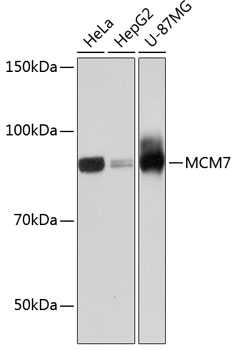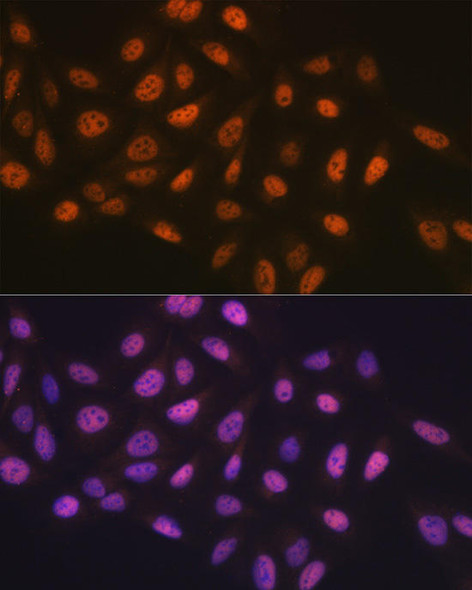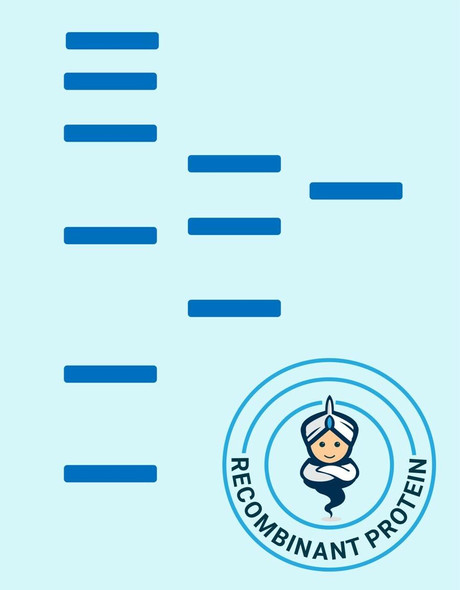Anti-MCM7 Antibody (CAB11325)
- SKU:
- CAB11325
- Product type:
- Antibody
- Reactivity:
- Human
- Rat
- Host Species:
- Rabbit
- Isotype:
- IgG
- Antibody Type:
- Monoclonal Antibody
- Research Area:
- Cell Cycle
Frequently bought together:
Description
| Antibody Name: | Anti-MCM7 Antibody |
| Antibody SKU: | CAB11325 |
| Antibody Size: | 20uL, 50uL, 100uL |
| Application: | WB IHC IF IP |
| Reactivity: | Human, Rat |
| Host Species: | Rabbit |
| Immunogen: | A synthesized peptide derived from human MCM7 |
| Application: | WB IHC IF IP |
| Recommended Dilution: | WB 1:500 - 1:2000 IHC 1:50 - 1:200 IF 1:50 - 1:200 IP 1:50 - 1:200 |
| Reactivity: | Human, Rat |
| Positive Samples: | HeLa, HepG2, U-87MG |
| Immunogen: | A synthesized peptide derived from human MCM7 |
| Purification Method: | Affinity purification |
| Storage Buffer: | Store at -20°C. Avoid freeze / thaw cycles. Buffer: PBS with 0.02% sodium azide, 0.05% BSA, 50% glycerol, pH7.3. |
| Isotype: | IgG |
| Sequence: | Email for sequence |
| Gene ID: | 4176 |
| Uniprot: | P33993 |
| Cellular Location: | Nucleus |
| Calculated MW: | 81kDa |
| Observed MW: | 81KDa |
| Synonyms: | CDC47, MCM2, P1.1-MCM3, P1CDC47, P85MCM, PNAS146, PPP1R104 |
| Background: | The protein encoded by this gene is one of the highly conserved mini-chromosome maintenance proteins (MCM) that are essential for the initiation of eukaryotic genome replication. The hexameric protein complex formed by the MCM proteins is a key component of the pre-replication complex (pre_RC) and may be involved in the formation of replication forks and in the recruitment of other DNA replication related proteins. The MCM complex consisting of this protein and MCM2, 4 and 6 proteins possesses DNA helicase activity, and may act as a DNA unwinding enzyme. Cyclin D1-dependent kinase, CDK4, is found to associate with this protein, and may regulate the binding of this protein with the tumorsuppressor protein RB1/RB. Alternatively spliced transcript variants encoding distinct isoforms have been reported. [provided by RefSeq, Jul 2008] |
| UniProt Protein Function: | MCM7: Acts as component of the MCM2-7 complex (MCM complex) which is the putative replicative helicase essential for 'once per cell cycle' DNA replication initiation and elongation in eukaryotic cells. The active ATPase sites in the MCM2-7 ring are formed through the interaction surfaces of two neighboring subunits such that a critical structure of a conserved arginine finger motif is provided in trans relative to the ATP-binding site of the Walker A box of the adjacent subunit. The six ATPase active sites, however, are likely to contribute differentially to the complex helicase activity. Required for S-phase checkpoint activation upon UV-induced damage. Component of the MCM2-7 complex. The complex forms a toroidal hexameric ring with the proposed subunit order MCM2-MCM6- MCM4-MCM7-MCM3-MCM5 (By simililarity). Interacts with the ATR- ATRIP complex and with RAD17. Interacts with TIPIN. Interacts with MCMBP. Belongs to the MCM family. 2 isoforms of the human protein are produced by alternative splicing. |
| UniProt Protein Details: | Protein type:DNA replication; EC 3.6.4.12; Motility/polarity/chemotaxis Chromosomal Location of Human Ortholog: 7q22.1 Cellular Component: chromatin; cytoplasm; MCM complex; membrane; nuclear chromosome, telomeric region; nucleoplasm Molecular Function:ATP-dependent DNA helicase activity; DNA binding; protein binding Biological Process: DNA replication; G1/S transition of mitotic cell cycle; regulation of phosphorylation; response to DNA damage stimulus |
| NCBI Summary: | The protein encoded by this gene is one of the highly conserved mini-chromosome maintenance proteins (MCM) that are essential for the initiation of eukaryotic genome replication. The hexameric protein complex formed by the MCM proteins is a key component of the pre-replication complex (pre_RC) and may be involved in the formation of replication forks and in the recruitment of other DNA replication related proteins. The MCM complex consisting of this protein and MCM2, 4 and 6 proteins possesses DNA helicase activity, and may act as a DNA unwinding enzyme. Cyclin D1-dependent kinase, CDK4, is found to associate with this protein, and may regulate the binding of this protein with the tumorsuppressor protein RB1/RB. Alternatively spliced transcript variants encoding distinct isoforms have been reported. [provided by RefSeq, Jul 2008] |
| UniProt Code: | P33993 |
| NCBI GenInfo Identifier: | 20981696 |
| NCBI Gene ID: | 4176 |
| NCBI Accession: | P33993.4 |
| UniProt Secondary Accession: | P33993,Q15076, Q96D34, Q96GL1, A4D2A1, A4D2A2, E9PGN9 |
| UniProt Related Accession: | P33993 |
| Molecular Weight: | 60,643 Da |
| NCBI Full Name: | DNA replication licensing factor MCM7 |
| NCBI Synonym Full Names: | minichromosome maintenance complex component 7 |
| NCBI Official Symbol: | MCM7 |
| NCBI Official Synonym Symbols: | MCM2; CDC47; P85MCM; P1CDC47; PNAS146; PPP1R104; P1.1-MCM3 |
| NCBI Protein Information: | DNA replication licensing factor MCM7 |
| UniProt Protein Name: | DNA replication licensing factor MCM7 |
| UniProt Synonym Protein Names: | CDC47 homolog; P1.1-MCM3 |
| Protein Family: | DNA replication licensing factor |
| UniProt Gene Name: | MCM7 |






